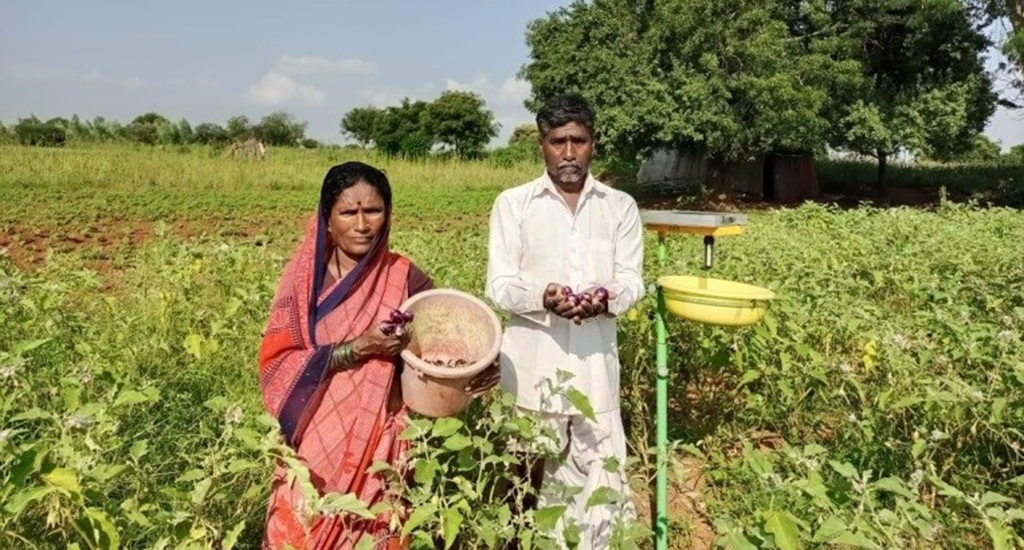
Farming sans chemical pesticides, courtesy solar-powered insect traps
Solar-powered insect traps are an eco-friendly alternative to chemical pesticides, which also reduce costs for farmers and produce better quality crops.

Solar-powered insect traps are an eco-friendly alternative to chemical pesticides, which also reduce costs for farmers and produce better quality crops.
Like many other farmers, Shivaputrappa Kumbar of Hunasihal village in Koppal district of Karnataka used chemical pesticides to tackle pest menace. It not only cost him Rs 5,200 per crop, but also deteriorated the quality of soil in his land.
The solar-powered insect trap proved to be a viable alternative to chemical pesticides. He is now spending much less money and the degradation of his land has stopped.
Nearly 200 farmers find the solar insect trap to be a cost-effective solution to controlling pests.
The solar insect traps were introduced under the holistic rural development project (HRDP) implemented by BAIF, a development organisation, with support from the HDFC bank.
The project was started in 2021-22 and covered 10 villages in Yelburga taluk of Koppal district.
Since it was the launch of a new technology for these farmers, each trap costing Rs 5,400 was fully subsidised.
The main purpose of the intervention is improving the livelihood of marginalised farmers by minimising the usage of chemical pesticides thereby reducing the expenditure.
It is also aimed at protecting human and ecosystem health.
Kumbar came forward to install the solar insect trap and BAIF helped him install it.
Subsequently solar insect traps were installed for 178 farmers through the HRDP project.
The BAIF team explained to the farmers how the trap worked and what they should do to ensure that it worked efficiently. They emphasised that the farmers should clean the bowl every day to avoid the foul odour that decaying pests in the bowl’s water would cause.
Also Read | Women adopt organic farming to transform a Karnataka village
Kumbar installed the trap in the plots where he cultivated vegetables. On his four acres of land, in the kharif season he cultivated chilli, cauliflower and tomato, while in rabi he cultivated tomato and cabbage.
Shivputrappa was astonished to see hundreds of pests falling into the bowl. He regularly cleaned the bowl and replaced it with fresh water. He buried the dead pests in a pit.
He also noted the stark change in the vegetables, in terms of their healthy growth, specifically compared to the growth when he used to spray chemical pesticides.
Importantly, with the reduced pest attack, he could gradually reduce the application of chemical pesticides by almost 50%.
He saved Rs 4,000 on pesticide cost for each crop. He also saved time spent in searching for labour to spray, besides saving Rs 1,200 on labour expenses for each crop. In all, he saved Rs 26,000 on five vegetables cultivated in kharif and rabi seasons.
The reduced use of chemical pesticides will obviously lead to the ecosystem protection through reduced contamination of soil, water, vegetation and other organisms.
It would also decrease the direct exposure of farmers to the chemicals and would further reduce residues in the produced food.
This simple but effective solar-powered insect trap has proven to be beneficial for farmers. It reduced the usage of chemical pesticides that is harmful in terms of health, soil fertility and costs.
Also Read | Want bumper paddy harvest? Breed fish, say Bihar farmers
Seeing the success of farmers like Kumbar, more and more farmers are willing to adopt this new solar trap. Also, with the market price of the solar insect trap reducing considerably, it would be easier for the farmers to buy this without any financial aid.
The lead image shows farmers using solar-powered insect traps in their farm (Photo by Sunitha Kusugal)
Ganga Ankad & Sunitha Kusugal are field journalist working with BAIF Development Research Foundation.